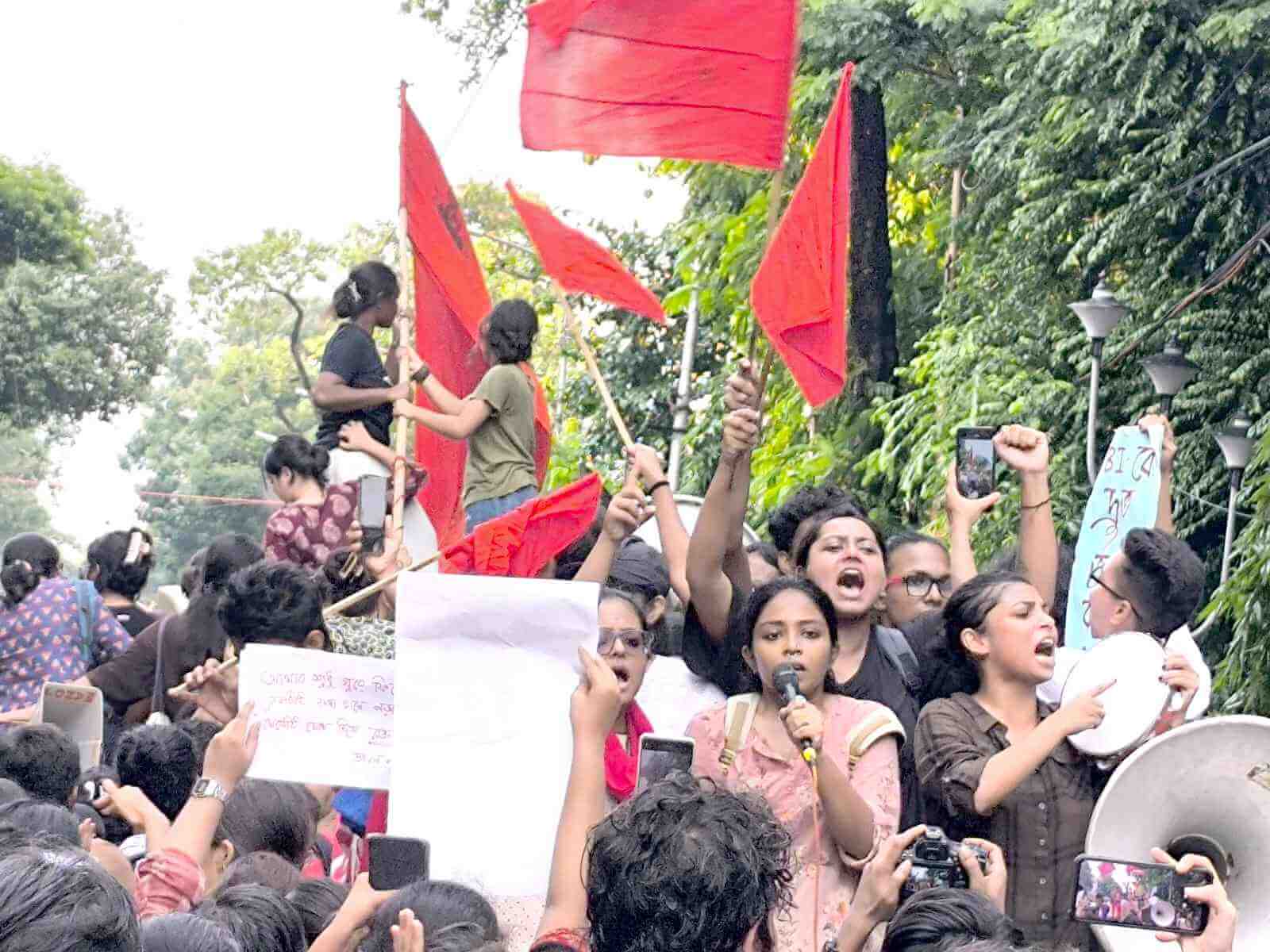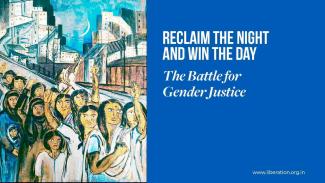On the early morning of 9th August, a horrifying crime shocked the state of West Bengal. A young post-graduate trainee doctor was brutally raped and murdered at her workplace in the Chest Medicine Department of R G Kar Medical College & Hospital in Kolkata. This atrocity not only shattered the medical community but also exposed the deep-seated patriarchal violence and corruption permeated in our country.
The response from the RG Kar Medical College administration exacerbated the tragedy. The principal, Mr. Sandip Ghosh, summoned the grieving parents of the victim, only to make them wait for three agonizing hours before they could see their daughter's lifeless body. Ghosh while informing the parents about the incident allgedly tried to pass it off as suicide! According to reports, despite the visible and gruesome injuries pointing towards a criminal offence, there was procedural delay in filing the FIR. The crime was detected in the early hours of the morning and no FIR was filed until late at night. The Supreme Court hearing the case of August 22 raised serious questions on handling of case by Kolkata police and observed, “this is very surprising, post-mortem precedes registration of the UD [unnatural death] case!
On August 10th, the prime suspect, Sanjay Roy, was arrested. However, the arrest did little to quell the growing anger among the public as the hospital and police administrations actions (rather, inaction) pointed towards several glaring shortcomings. The incident had already brought to light the long-standing corruption within public hospitals and raised serious questions about the principal's role in potentially covering up the crime. Mr. Ghosh's shocking and insensitive remark that it was irresponsible for the victim to be alone at night further inflamed further public fury. His words were emblematic of the pervasive rape culture that continues to plague cases of sexual violence in India. On the other hand, instead of taking the accountability of such system level failure, Chief Minister Mamata Banerjee who is also in charge of the Health department, tried to channelize the collective grief, anger and rage towards the demand of hanging of the accused!
In response to the shameless victim-blaming and efforts to cover up the brutal rape and murder, a powerful movement began to take shape. Women, trans, and queer people from all walks of life—across class, caste, sexuality, and religion—came together to Reclaim the Night on the eve of Independence Day. It is metaphorically significant that, two years ago on the same Independence Day, Bilkis Bano’s rapists were acquitted by Gujrat high court and welcomed with garlands by BJP workers, highlighting a crisis in the equality and autonomy of women and gender minorities. In stark contrast, two years later, the mass upsurge of women and gender minorities under the banner of Reclaim the Night powerfully reasserted the right to gender justice, freedom & safety raising slogans for uprooting the brahmanical patriarchal system. Lakhs of women, trans, and queer individuals along with healthcare workers, civil society members and students-youth organisations across West Bengal gathered in protest against sexual violence. The battle for justice soon spread over other cities of India including Mumbai, Patna and Delhi, to claim the night and ensure women’s freedom. It demonstrated how feminist movements are spaces for celebrating difference and diversity. For example, Mid-day meal workers organized a Reclaim the Night event in Howrah and North 24 Parganas, while trans and queer school students organized a similar event in Chakda, Nadia district. This movement sought to challenge brahmanical patriarchal norms that restrict women's freedom and safety in public spaces and their right to a dignified and democratic life. The call for justice was not just for the young doctor but for every individual who faces rape culture on an everyday basis.
As the movement gained momentum, on the same night of Reclaim the Night, RG Kar and NRS hospitals saw protesting students and doctors being met with vandalism and brutality by certain groups in an attempt to divert the public attention and weakness the movement for justice. The night also witnessed another horrific crime: an Adivasi woman was brutally murdered in Shaktigarh, Bardhaman. The violence did not stop there. On August 15th, several trans women were assaulted by the Railway Protection Force (RPF) at Rabindra Sadan, followed by the naked parade of a woman by BJP activists in Nandigram. Many women and gender minorities took to social media to share their traumatic experiences during the Reclaim the Night gatherings, where they were abused and heckled. This underscores that reclamation cannot remain a mere symbolic protest; the widely spread masses need sensitization, orientation and a feminist vision to culminate in a movement that can truly reshape public discourse, allowing women, trans, and queer communities to reclaim the world without fear of abuse and humiliation. Despite these setbacks, the determination of the movement has only grown stronger. On August 17th, a rally with over 3,000 participants was organized to march to RG Kar in solidarity with the protesting students and doctors. While the unprecedented uprising of the masses has struck fear in the hearts of the ruling TMC government, it has also drawn the attention of fascist forces like the RSS and BJP. These groups, which have historically enabled rape culture and suppressed voices demanding gender justice, are now attempting to co-opt dissenting voices for their own vested interests. It is crucial to remember that the brutal rape and murder of the medical student at RG Kar is not an isolated incident but a reflection of the patriarchal power structures perpetuated by those in power, regardless of the political regime.
It is important for us to look back at the Nirbhaya movement which had ignited nationwide protests in India’s socio-political landscape, profoundly impacting the discourse on women's safety and autonomy in workplaces particularly concerning prevention of sexual harassment at workplaces, both formal and informal sector. The movement's impact led to the establishment of Justice Verma Commission and the introduction of the Prevention of Sexual Harassment (POSH) Law. Women, students, citizen’s organisations including AIPWA and AISA were instrumental in catalyzing substantial changes in the legal and institutional framework governing women's safety and agency, particularly in the context of the workplace. The Prevention of Sexual Harassment at Workplace (POSH) Act, 2013, was enacted to create safer workplaces for women, recognizing sexual harassment as a direct violation of women’s fundamental rights to life and dignity. It acknowledges the inherent power imbalances in workplaces that often place women in subordinate positions. Covering both organized and unorganized sectors, the POSH Act mandates the formation of Internal Complaints Committees (ICCs) within organizations and Local Committees under district administrations to address complaints from women in the unorganized sector. The Justice Verma Commission's recommendations also emphasized the need for Gender Sensitization Committees Against Sexual Harassment (GSCASH) to oversee the effective implementation of the POSH Act in educational institutions and workplaces. A decade later, the incident at RG Kar Medical College highlights the urgent need to reassess the effectiveness of the POSH Act and the functionality of its mechanisms. The dysfunction of the Internal Complaints Committee (ICC) at RG Kar is particularly concerning, especially since Mr. Sandip Ghosh, the accused principal in the cover-up, was a member of the ICC. The issue stems from the ICC being chosen rather than elected, contrary to what the Justice Verma Commission advised. This situation highlights that without regular monitoring by stakeholders from legal, feminist, and citizen spaces, addressing the power imbalances in workplaces remains unattainable.
In this context, the West Bengal government's 17-point circular, feels like a rushed attempt to silence the ongoing efforts rather than genuinely address the issues that the Reclaim the Night movement has raised. The proposed measures, such as reducing night duties for women, are a step backward, directly contradicting to the demands of ensuring structural measures for autonomy of women as championed by the movement. Steps such as deploying police security, surveillance at workplaces promotes control over women and marginalized communities, rather than addressing the root causes of gender based violence. For example, the space where the RG Kar incident took place was covered by CCTV yet the crime couldn’t be stopped, which raised question that what does safe spaces mean for women and gender minorities. The lack of practical implementation plans, such as the vague suggestions for restroom construction, only further highlights the disconnect between the state’s proposals and the demands raised by the movement. In response to the state’s efforts to surveil and limit women’s autonomy, a call was made on August 19th under the slogan 'Solidarity, Not Surveillance; Liberation, Not Protection.' This call was celebrated at 30 locations across the state of West Bengal, where women, trans, and queer individuals organized human chains to spread the message.
Along with demanding a fast and transparent CBI investigation into the brutal murder and rape of the PTG doctor at RG Kar and thorough investigation and punishment for all those responsible for the vandalism and targeted attack at RG Kar on the night of August 14th, including the administrative and police officers on duty that night; it is high time that we leverage on the mass outrage to strengthen the demands for structural changes to ensure rights of women and gender minorities to reclaim our space as equal citizens of the state which have been far too neglected by governments, judiciary and people in power. We need to raise voice for systemic changes like reconstitution of ICCs and LCCs with elected representatives, construction of public toilets at every 1 km distance, 24-hour public transport, creches for working women, and hostels for those working late hours. The services must be available at free or subsidized rate. Enacting these measures will ensure that women and gender minorities can truly access the public space and practice autonomy. Most importantly, there must be a comprehensive review of the enactment of POSH act, and the status of ICCs and LCCs across India, by establishing a special commission.
The Reclaim the Night movement is a powerful reminder that the fight against patriarchal violence is far from over. It is a call to action for all those who believe in justice, equality, and the right to live without fear. We must remember that the fight is not just against the individuals who commit these crimes but against the entire system that allows such atrocities to happen. We must be determined to continue this struggle until justice is secured for all women, trans, and queer people, and until we create a society where everyone can live and work in safety and dignity.












